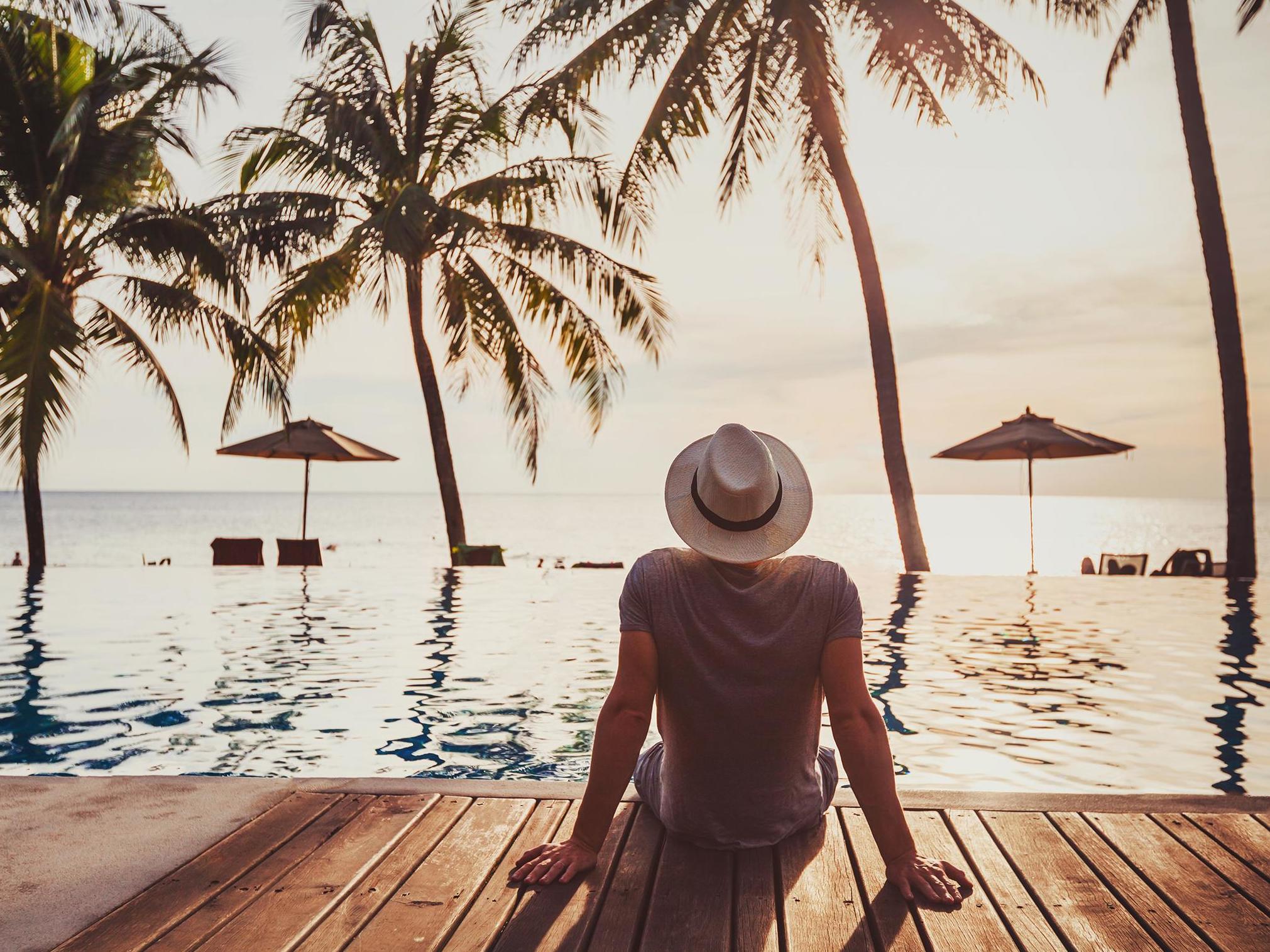Peak holiday feeling arrives on day two and it’s downhill from there
There’s nothing we won’t sacrifice for that week in the sun. Christine Manby looks at how we can extend the benefits of the holiday glow


That moment we’ve been looking forward to all year is finally upon us: the summer holiday season. The bad news, even if you’ve got a whole fortnight on the beach to look forward to, is that research commissioned by travel company TUI suggests you’ll reach “peak holiday feeling” by the end of day two and it’s all downhill from there. Less than a week after you get back, it’ll be as though you’ve never been away.
As a nation, we’re taking fewer holidays than usual. Abta, the Association of British Travel Agents, reported a fall in the number of trips taken between 2017 and 2018 – from an average of 3.8 to 3.4 a year. Economic uncertainty might account for some of the drop off but Abta also discovered that we’ll cut back on almost anything before we’ll cut back on our “holibobs” (personally, I’m cutting back on people who say “holibobs”).
We’ll give up booze, cigarettes, eating out… all the things that make the working week just about bearable. There’s nothing we won’t sacrifice for our moment in the sun. With that in mind, it seems more important than ever to make sure those days away count. So how can you hang on to that holiday buzz?
TUI’s report was drawn up by Dr Tali Sharot, director of UCL’s Affective Brain Lab. She and her team had the onerous task of conducting a survey of guests at the TUI Sensatori resort in the Dominican Republic.
Dr Sharot’s research discovered that even if the holiday feeling wears off much more quickly than we’d like, the positive effects of a holiday can begin long before you’ve even started packing. When she asked her holidaymakers what triggered the “holiday feeling” for them, she discovered that booking the trip was right up there with sipping that first Aperol Spritz.
In fact, 23 per cent of the “holiday feeling” triggers Sharot’s subjects offered happen before going away. They included looking at the weather report for your destination and putting your “out of office” email on. The power of anticipation is backed up by hard science. A 2010 brain imaging study conducted by Sharot’s department showed that merely imagining a holiday can activate neurons in the striatum, the brain’s reward centre.
And after you’ve had that first Spritz? Dr Sharot writes: “Holiday ‘firsts’ are also hugely important ... Neuroscience studies have shown that novelty – the quality of something being new – is incredibly rewarding in itself. When things (places, experiences, items) are new an additional response is triggered in the brain’s reward system, to give us a spark of positive feeling.”
So after that first Aperol Spritz, you should have your first Pina Colada and then your first Tequila Sunrise... you get the idea.
Dr Sharot suggests that looking at photos taken on your trip is one way to retain that glow for a little longer. Her research did not reveal whether forcing other people to look at your holiday photos has any kind of positive effect
When you get back, Dr Sharot suggests that looking at photos taken on your trip is one way to retain that glow for a little longer. Her research did not reveal whether forcing other people to look at your holiday photos has any kind of positive effect. If they weren’t there with you, then my guess is not. At least for them.
Dr Sebastian Filep, senior lecturer in the tourism department at New Zealand’s University of Otago, believes that regular holidays should be prescribed as freely as anti-depressants. He says: ”Happiness is good for overall physical and mental health and holidays are a good vehicle for experiencing happiness.” So long as you holiday properly...
Vacation Rules, the book Filep co-authored with Rod Cuthbert, tells you how. It refers to the works of Dr Martin Seligman, who identified five critical elements for personal well-being. Going by the acronym Perma, those five elements are: positive emotions, engagement, relationships, meaning and a sense of achievement. To get maximum benefit from your time off, Cuthbert and Filep propose that the best kind of holiday should incorporate all five.
Thus Vacation Rules suggests you encourage positive emotions by spending time in nature. Hanging out by the sea has been proven to make us feel good. Likewise, time spent in the forest is well known to boost immunity. Go forest bathing. But watch out for ticks!
Find engagement on that mini-break by being “mindful” while you’re sight-seeing. Slow down. Take it all in properly. Though on behalf of my fellow city dwellers, I beg visitors to London to please refrain from walking at a mindful pace through tube stations during rush hour.
Nurture your relationships by making sure you choose the right companion for your trip and by accepting that even the most laid back travel partner won’t always want to do the same thing as you. Or even be in the same country.
Find meaning by working out what you want from the trip before you go and making a plan for how you’ll get the most benefit from your time away. Maybe by composing that resignation letter?
Finally, get a sense of achievement by using your holiday time to learn something new, say by taking a cooking class or brushing up your language skills. Or just by managing to stay calm when your flight is delayed by a drone…
To get around the feeling of having reached “peak holiday” by day two, Cuthbert and Filep also suggest you “plan a big ending” by making sure you save some of the excursions or restaurant visits you’ve most been looking forward to until the last few days of the trip.
But you don’t have to plan a particularly “big” holiday to get maximum feel-good vibes. Interestingly, a number of small trips spread throughout the year may be better for our happiness than saving up for a blow-out “once in a lifetime” trip around the world. It’s thanks to the phenomenon we call the “hedonic treadmill”, which dictates that even after a huge extravagant treat, we go back to our pre-treat level of happiness/unhappiness relatively quickly.
On behalf of my fellow city dwellers, I beg visitors to London to please refrain from walking at a mindful pace through tube stations during rush hour
The “hedonic treadmill” explains why just a few short years after they hit the jackpot, lottery winners are rarely any happier than they were before their numbers came in. So it makes sense to chase the frequent small highs rather than save up for the big ones, when a weekend away could make you feel just as good as a month on a Caribbean cruise.
Dan Ariely, author of The Upside of Irrationality, explains: “On a long vacation, day seven is less good than day one because it’s not as exciting. That’s why in general, going away four times [a year] provides more benefit than you would expect, and going away for one week provides less.” His unusual solution? Take some work with you to do halfway through the break to remind you how much nicer it is to be by the pool than in the office. Seems like a fast way to upset the relationships with your all important holiday companion, to me. A far more sensible solution would surely be to start researching your next trip while you’re still by the pool.
Wherever you’re going and whatever you’re doing this summer, I wish you a bon voyage. But if you’re not going anywhere, you can still get a warm holiday glow by thinking how much nicer it is to be sitting in a deserted city park than queueing for passport control while French customs officers practice for Brexit.

Join our commenting forum
Join thought-provoking conversations, follow other Independent readers and see their replies
Comments
Bookmark popover
Removed from bookmarks